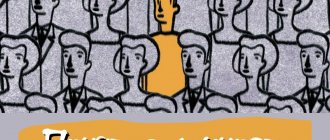Definition of personality in different sciences
In sociology, the concept of personality is studied in the process of relationships between people, as well as as a separate element of the social system. In addition, sociology conducts the study of personality when it is still being formed, in the process of its formation and the acquisition by an individual of certain qualities characteristic only of him. In contrast to legal science, which looks at this as a completely ready-made and formed concept.
In jurisprudence, a person is understood as an individual who has certain rights, freedom of action and obligations as an ordinary person and as a citizen in general. This concept refers to the personality of a specific person who has a number of socially important qualities that manifest themselves in relationships with other people.
Concept
A person cannot exist outside of society .
This is its main difference from animals.
A social personality is any individual who belongs to social groups, enters into social relations, and is an independent member of society with certain rights and responsibilities.
Each person has many social personalities, since his life in society, as a rule, is quite multifaceted . The same person can be perceived differently from a social point of view by different people in his environment.
For example, the social personality seen by colleagues may have nothing in common with the personality familiar to friends or relatives.
The socio-psychological side of any personality includes a complex of specific individual parameters. Each personality is a separate person, with an inherent set of social and psychological traits.
The formation of a socio-psychological portrait of an individual is influenced by many factors: anatomical features, mental properties, immediate environment, social groups, education, sphere of professional activity, ideology, religion, etc.
Each person is initially a “blank slate” , which, in the process of socialization, under the influence of the above factors, begins to form into a specific personality with its own individual set of psychological and social traits.
Basic approaches to studying personality
There are many different theories of personality in the social sciences. Among them, the following main approaches can be distinguished:
- Dialectical-materialistic approach , according to which the personality develops according to a dialectical process determined by the following factors: the origin of the individual, the society surrounding him, upbringing and self-education skills. From the very beginning, a person is considered a social being, his personality is formed in the process of interaction with society, that is, when a person interacts with the world around him in the process of his formation and self-awareness.
- Anthropological approach . In this approach, the concept of personality is perceived as the bearer of the characteristic properties of all humanity. Personality is equated with the individual. This approach compares the understanding of personality, person and individual. He ignores the fact that the social environment plays an important role in shaping personality.
- Normative approach . According to this approach, the concept of personality is associated with the acquisition of good qualities that relate to a person's consciousness and actions.
- Sociological approach . Its essence lies in the fact that every person is an individual, regardless of his socially significant characteristics. The concept of personality in this approach is considered as an object and products of relations with society.
- Personal approach . In contrast to the anthropological and sociological approach, this concept makes it possible to understand personality as an individual and unique organism independent of any factors.
- Biological-genetic approach . According to this approach, it is believed that such behavior in people is embedded in their genes. What can be considered primitive determinism. This approach neglects the importance of social conditions and cultural heritage in the formation of an individual in society.
The concept of personality. Personality as a social type.
Seminar No. 3.
1. The concept of personality. Personality as a social type.
What is personality? In order to answer this question, it is necessary, first of all, to distinguish between the concepts of “person,” “individual,” and “personality.” The concept “man” is used to characterize the universal qualities and abilities inherent in all people. This concept emphasizes the presence in the world of such a special historically developing community as the human race (homo sapiens).
But humanity as such does not exist independently. Specific people live and act. The existence of individual representatives of humanity is expressed by the concept of “individual” . An individual is a single representative of the human race, a specific bearer of all the social and psychological traits of humanity: reason, will, needs, interests, and so on. The concept of “individual” in this case is used in the meaning of “a specific person”. With this formulation of the question, both the peculiarities of the action of various biological factors (age characteristics, gender, temperament) and the differences in the social conditions of human life are not recorded. However, it is impossible to completely abstract from the action of these factors. It is obvious that there are big differences between the life of a child and an adult, a person of a primitive society and more developed historical eras. To reflect the specific historical features of human development at various levels of his individual and historical development, along with the concept of “individual”, the concept of “personality” . The individual in this case is considered as the starting point for the formation of personality, personality is the result of the development of the individual, the most complete embodiment of all human qualities.
Personality is one of those phenomena that is rarely interpreted in the same way by two different authors. All definitions of personality are determined in one way or another by two opposing views on its development. From the point of view of some, each personality is formed and develops in accordance with its innate qualities and abilities, and the social environment plays a very insignificant role. Representatives of another point of view completely reject the innate internal traits and abilities of the individual, believing that personality is a certain product, completely formed in the course of social experience. Obviously, these are extreme points of view on the process of personality formation. In our analysis, we, of course, must take into account both the biological characteristics of the individual and his social experience. At the same time, practice shows that social factors in personality formation are more significant. The definition of personality given by V. Yadov seems satisfactory: “Personality is the integrity of a person’s social properties, a product of social development and the inclusion of the individual in the system of social relations through active activity and communication.” According to this view, personality develops from a biological organism solely through various types of social and cultural experiences. At the same time, it is not denied that she has innate abilities, temperament and predisposition, which significantly influence the process of formation of personality traits.
Sociology identifies the socially typical in personality and involves not a simple consideration of the personality in all its diversity, but the study of it as a set of social relations, i.e. as a product of society. This presupposes, on the one hand, the study of the natural connection between the individual and society, the individual and the group, the regulation and self-regulation of the social behavior of the individual, and on the other hand, the self-inclusion of the individual in various spheres of social activity, his attitude to this activity, i.e. recognition of man as a social being. All this means that the inherent diversity of desires, aspirations, life and value orientations and needs, realized in the course of social interaction with other people, has essentially one source - social life.
2. Socialization of the individual.
Socialization is the process of an individual’s assimilation of patterns of behavior, social norms and values necessary for his successful functioning in a given society. That is, socialization is the way in which attitudes corresponding to social roles are acquired. Socialization covers all processes of cultural inclusion, training and education, through which a person acquires a social nature and the ability to participate in social life.
Socialization involves the formation of intellectual, social, and physical skills. Socialization as a process represents: on the one hand, the transfer by society of socio-historical experience, culture, rules and norms of behavior and value guidelines, on the other hand, their assimilation by the individual. In addition, the process of socialization implies a twofold process: the process of gradual disclosure of natural qualities in an individual, and the process of external influence (targeted and undirected education). Therefore, in the process of socialization, a huge role is played not only by the natural inclinations of a person, but also by the social environment with its diverse spheres, a person’s social circles, subjects of socialization (or agents of socialization - those who influence the individual) with their mechanisms of ideological, pedagogical, moral, aesthetic and other types of influence on the thinking and behavior of the socializing person.
The social environment with its various spheres (social, economic, political, cultural, etc.) is an objective factor of socialization. Those. the main agents of socialization are the family, various types of communities (collectives, ethnic groups, nationalities, classes, social strata, society as a whole - everything that includes and surrounds a person. Each sphere of social life (material and spiritual) participates in the process of socialization - purposeful and undirected parenting.
Socialization, like any other social process, is characterized by periodicity and stages. In domestic sociology, there are 3 periods of socialization (pre-labor, labor and post-labor) and 4 stages - early (before school), training, social maturity, completion of the life cycle. Socialization processes in each period have their own specifics.
At the first stage, the agent of socialization is primarily the family, at the second - the school, etc. A person becomes aware of himself by observing other members of the group, constantly comparing himself with them. Society cannot exist without mental reactions and mutual assessments. It is thanks to mutual contacts that people become aware of social values, acquire social experience and skills of social behavior. A person becomes a person thanks to his interaction with other people precisely within the framework of small primary groups.
The process of socialization reaches a certain degree of completion when the individual achieves integral social status. Naturally, the process of socialization is most intense during childhood and adolescence, but personality development continues in adulthood and old age. Therefore, many sociologists believe that the process of socialization continues throughout life. Although the socialization of children and adults has significant differences.
The socialization of adults is different in that it is mainly a change in external behavior (the socialization of children is the formation of value orientations); adults are able to evaluate norms (and children only assimilate them). Adult socialization aims to help a person master certain skills. For example, mastering a new social role after: retirement, changing profession or social status. Another point of view on the socialization of adults is that adults gradually abandon naive children's ideas (for example, about the unshakability of authorities, about absolute justice, etc.), from the idea that there is only white and black.
But socialization not only gives the individual the opportunity to integrate into society and deal with each other through the development of social roles. It also ensures the preservation of society. Although the number of its members is constantly changing, as people are born and die, socialization contributes to the preservation of society itself, instilling generally accepted ideals, values, and patterns of behavior in new citizens.
So, the essence of the socialization process is that socialization has two goals: to help the individual integrate into society on the basis of a social role, and to ensure the preservation of society through the assimilation by its new members of the beliefs and patterns of behavior that have developed in society.
3. Personality as an active subject.
4. Role theories of personality.
Every person living in society is included in many different social groups (family, study group, friendly company, etc.). In each of these groups he occupies a certain position, has a certain status, and certain requirements are imposed on him. Thus, the same person must behave in one situation as a father, in another as a friend, in a third as a boss, i.e., act in different roles.
A social role is a way of behavior of people that corresponds to accepted norms, depending on their status or position in society, in the system of interpersonal relations. Mastering social roles is part of the process of socialization of the individual, an indispensable condition for a person to “grow into” the society of his own kind. Socialization is the process and result of an individual’s assimilation and active reproduction of social experience, carried out in communication and activity. By mastering social roles, a person assimilates social standards of behavior, learns to evaluate himself from the outside and exercise self-control. The role concept of personality arose in American social psychology in the 30s of the 20th century. (C. Cooley, J. Mead) and became widespread in various sociological movements, primarily in structural-functional analysis.
Social behavior as perceived by psychologists and sociologists
Charles Cooley believed that personality is formed on the basis of many interactions between people and the world around them. In the process of these interactions, people create their “mirror self”, consisting of three elements:
1) how we think others perceive us (I'm sure people are paying attention to my new hairstyle);
2) how we think they react to what they see (I'm sure they like my new hairstyle);
3) how we respond to the reactions we perceive from others (Apparently, I will always wear my hair like this)
American psychologist George Herbert Mead went further in his analysis of the process of development of our “I”. According to Mead, the process of personality formation includes three different stages.
The first is imitation. At this stage, children copy the behavior of adults without understanding it. This is followed by the play stage, when children understand behavior as the performance of certain roles: doctor, fireman, race driver, etc.; during the game they reproduce these roles. The transition from one role to another develops in children the ability to give their thoughts and actions the meaning that other members of society give them - this is the next important step in the process of creating their own self. The third stage is the stage of collective games, when children learn to be aware of the expectations of not only one person, but also the entire group.
The role theory of personality describes its social behavior with two main concepts: “social status” and “social role”. A person can have several statuses. But more often than not, only one determines his position in society. It often happens that the main, or integral, status is determined by his position (for example, director, professor). Social status is reflected both in external behavior and appearance (clothing, jargon and other signs of social and professional affiliation), and in internal position (in attitudes, value orientations, motivations)
Sociologists distinguish between prescribed and acquired statuses. Prescribed means imposed by society, regardless of the efforts and merits of the individual. It is determined by ethnic origin, place of birth, family, etc. The acquired status is determined by the efforts of the person himself (for example, writer, scientist, director). Natural and professional-official statuses are also distinguished. The natural status of a person presupposes significant and relatively stable characteristics of a person (men and women, childhood, youth, maturity, old age, etc.). Professional and official status is the basic status of an individual, which for an adult is most often the basis of an integral status. It records the social, economic, production and technical position (banker, engineer, lawyer, etc.).
Social status denotes the specific place that an individual occupies in a given social system. The totality of demands placed on an individual by society forms the content of a social role. A social role is a set of actions that a person occupying a given status in the social system must perform. Each status usually includes a number of roles. The set of roles arising from a given status is called a role set. A social role is divided into role expectations - what, according to the “rules of the game”, is expected from a particular role, and role behavior - what a person actually performs within the framework of his role. Every time a person takes on a particular role, a person more or less clearly understands the rights and responsibilities associated with it, approximately knows the scheme and sequence of actions, and builds his behavior in accordance with the expectations of others.
Talcott Parsons tried to systematize social behavior. He believed that any role could be described using five basic characteristics:
- Emotionality. Some roles (for example, nurse, doctor or police officer) require emotional restraint in situations that are usually accompanied by violent expression of feelings (we are talking about illness, suffering, death). Family members and friends are expected to show less reserved expressions of feelings.
- Method of receipt. Some roles are conditioned by prescribed statuses - for example, child, youth or adult citizen; they are determined by the age of the person playing the role. Other roles are won; When we talk about a professor, we mean a role that is not achieved automatically, but as a result of the individual’s efforts.
— Scale. Some roles are limited to strictly defined aspects of human interaction. For example, the doctor and patient roles are limited to issues that directly relate to the patient's health. A broader relationship is established between a small child and his mother or father; Each parent is concerned about many aspects of their child’s life.
- Formalization. Some roles involve interacting with people according to set rules. For example, a librarian is obliged to issue books for a certain period of time and demand a fine for each day of overdue from those who delay the books. In other roles, you may receive special treatment from those with whom you have a personal relationship. For example, we do not expect a brother or sister to pay us for a service rendered to them, although we might accept payment from a stranger.
— Motivation. Different roles are driven by different motives. It is expected, say, that an enterprising person is absorbed in his own interests - his actions are determined by the desire to obtain maximum profit. But the priest is supposed to work primarily for the public good and not for personal gain.
Role theory describes well the adaptive side of the process of personal socialization. But this scheme cannot be taken as the only and exhaustive one, since it leaves the active, creative personal principle in the shadows
5. Deviant behavior as a social phenomenon. Causes and types of deviant behavior.
The process of socialization reaches a certain degree of completion when the individual reaches social maturity, which is characterized by the individual acquiring an integral social status. However, in the process of socialization, failures and failures are possible. A manifestation of the shortcomings of socialization is deviant behavior - these are various forms of negative behavior of individuals, the sphere of moral vices, deviations from principles, norms of morality and law. The main forms of deviant behavior include delinquency, including crime, drunkenness, drug addiction, prostitution, and suicide. Numerous forms of deviant behavior indicate a state of conflict between personal and social interests. Deviant behavior is most often an attempt to leave society, to escape from everyday life problems and adversities, to overcome a state of uncertainty and tension through certain compensatory forms. However, deviant behavior is not always negative. It may be associated with the individual’s desire for something new, an attempt to overcome the conservative, which prevents him from moving forward. Various types of scientific, technical and artistic creativity can be classified as deviant behavior.
Various types of social deviations.
— Cultural and mental deviations.
— Individual and group deviations.
individual, when an individual rejects the norms of his subculture;
group, considered as conformal behavior of a member of a deviant group in relation to its subculture (for example, teenagers from difficult families who spend most of their lives in basements. “Basement life” seems normal to them, they have their own “basement” moral code, their own laws and cultural complexes. In this case, there is a group deviation from the dominant culture, since adolescents live in accordance with the norms of their own subculture).
— Primary and secondary deviations. Primary deviation refers to deviant behavior of an individual, which generally corresponds to cultural norms accepted in society. In this case, the deviations committed by the individual are so insignificant and tolerable that he is not socially classified as a deviant and does not consider himself such. For him and for those around him, deviation looks like just a little prank. Secondary deviation is a deviation from existing norms in a group, which is socially defined as deviantone.
— Culturally approved deviations. Deviant behavior is always assessed from the point of view of the culture accepted in a given society. It is necessary to highlight the necessary qualities and modes of behavior that can lead to socially approved deviations:
superintelligence.
special inclinations. They allow you to demonstrate unique qualities in very narrow, specific areas of activity.
super motivation. Many sociologists believe that intense motivation often serves as compensation for deprivations or experiences experienced in childhood or adolescence. For example, it is believed that Napoleon was highly motivated to achieve success and power as a result of the loneliness he experienced as a child;
personal qualities - personal traits and character traits that help achieve personal elevation;
Lucky case. Great achievements are not only a pronounced talent and desire, but also their manifestation in a certain place and at a certain time.
— Culturally condemned deviations. Most societies support and reward social deviance in the form of extraordinary achievements and activities aimed at developing the generally accepted values of the culture. Violation of moral norms and laws in society has always been strictly condemned and punished.
Causes of deviant behavior
There are three types of theories in the study of the causes of deviant behavior: physical type theories, psychoanalytic theories, and sociological or cultural theories. Let's look at each of them.
1. The basic premise of all theories of physical types is that certain physical traits of a person predetermine the various deviations from the norm that he commits. Among the followers of theories of physical types one can name C. Lombroso, E. Kretschmer, W. Sheldon. There is one basic idea in the works of these authors: people with a certain physical constitution are prone to commit social deviations that are condemned by society. However, practice has shown the inconsistency of theories of physical types. Everyone knows of cases when individuals with the faces of cherubs committed the most serious crimes, and an individual with coarse, “criminal” facial features could not offend a fly.
2. The basis of psychoanalytic theories of deviant behavior is the study of conflicts occurring in the consciousness of the individual. According to the theory of S. Freud, each person, under a layer of active consciousness, has an area of the unconscious - this is our mental energy, in which everything natural and primitive is concentrated. A person is able to protect himself from his own natural “lawless” state by forming his own self, as well as the so-called super-ego, determined exclusively by the culture of society. However, a state may arise when internal conflicts between the ego and the unconscious, as well as between the super-ego and the unconscious, destroy the defense and our inner, culturally ignorant content breaks through. In this case, a deviation from the cultural norms developed by the individual’s social environment may occur.
3. In accordance with sociological or cultural theories, individuals become deviants because the processes of socialization they undergo in a group are unsuccessful in relation to certain well-defined norms, and these failures affect the internal structure of the individual. When socialization processes are successful, the individual first adapts to the cultural norms surrounding him, then perceives them in such a way that the approved norms and values of the society or group become his emotional need, and the prohibitions of the culture become part of his consciousness. He perceives the norms of the culture in such a way that he automatically acts in the expected manner of behavior most of the time. An individual's mistakes are rare, and everyone around him knows that they are not his usual behavior. The presence in everyday practice of a large number of conflicting norms, the uncertainty in connection with this possible choice of course of behavior can lead to a phenomenon called anomie by E. Durkheim (a state of absence of norms). According to Durkheim, anomie is a state in which a person does not have a strong sense of belonging, no reliability and stability in choosing a line of normative behavior. Robert K. Merton made some changes to Durkheim's concept of anomie. He believes that the cause of deviance is the gap between the cultural goals of society and the socially approved (legal or institutional) means of achieving them. For example, while society supports the efforts of its members to achieve greater wealth and high social status, the legal means of members of society to achieve such a state are very limited: when a person cannot achieve wealth through talent and ability (legal means), he can resort to deception, forgery or theft, which is not approved by society.
6. Social control. Types of social control.
For self-preservation, any society establishes certain norms, rules of behavior and appropriate control over their implementation.
There are three main forms of control possible:
- isolation - excommunication from society for hardened criminals, up to and including the death penalty;
- isolation - limiting contacts, incomplete isolation, for example, a colony, a mental hospital;
- rehabilitation - preparation for returning to normal life. Rehabilitation of alcoholics, drug addicts, juvenile delinquents.
Control can be formal or informal.
Informal control is unofficial social pressure from others, the press. Punishment through criticism and ostracism is possible; threat of physical harm.
System of formal control - organizations created to protect order. We call them law enforcement. They have varying degrees of severity: tax inspectorate and tax police, police and riot police, courts, prisons, correctional labor colonies. Any society creates norms, rules, laws. For example, biblical commandments, traffic rules, criminal laws, etc.
Any society cannot function normally without a developed system of norms and rules that require each person to fulfill the requirements and responsibilities necessary for society. People in almost any society are controlled mainly through socialization in such a way that they perform most of their social roles unconsciously, naturally, by virtue of habits, customs, traditions and preferences.
How can a person with free will be forced to obey laws and moral standards that limit his freedom? Only by cultivating, educating in him from childhood those feelings and aspirations that lead him to the desire to streamline his life and obey the laws of society. People perform most of their social roles not entirely successfully, not because they are not capable, but because they either do not accept the content of these roles or do not want to fulfill them.
But in this case we are talking more about internal social control. There is also external group social control over human behavior. Each person is included in a variety of social groups: family, educational or industrial group, neighborhood community, circle of friends and comrades in common hobbies, etc. A necessary condition for the inclusion of an individual in a particular social group is the person’s compliance with certain cultural norms accepted by this group, forming a kind of code of conduct. Depending on the importance of the norm being violated, various sanctions are possible for the violator, including expulsion from the group.
In modern society, of course, rules and norms established at the level of primary social groups are not enough for social control. On the scale of the entire society, a system of laws and punishments for violation of established requirements and rules of behavior is being formed, and group social control is being applied on behalf of the entire society by state governing bodies. When an individual is unwilling to follow the laws, society resorts to coercion.
The rules vary in severity, and any violation of them entails different penalties. There are norms-rules and norms-expectations. Casual sexual relations violate norms and expectations and are not approved by public opinion (ladiesman, philanderer - social ostracism, rape - strict criminal punishment). Norms-expectations are regulated by public opinion, morality; norms-rules are regulated by laws and law enforcement agencies. Hence the corresponding punishments. A norm-expectation can turn into a norm-rule and vice versa.
It should be borne in mind that crime, to a certain extent, serves as an indicator of the imperfection of norms and often prepares the ground for the establishment of new norms of morality and law. Thus, in sociology, deviance appears as a social phenomenon that is studied using special sociological methods.
7. Social interactions and social relationships.
Personality structure
When studying and analyzing personality as a complex social phenomenon of society, it is important to highlight its structure, which is based on the following elements:
- biological level : it includes natural qualities inherent to all humanity (anatomical structure of the body, gender, character, etc.);
- psychological level : includes the psychological state of the individual such as the manifestation of feelings, freedom of choice, memories, way of thinking. Such features are closely related to hereditary personality traits;
- The social level is usually divided into the following sublevels:
- The sociological proper determines a person’s behavior in society, as well as his personal interests and pursued goals.
- Cultural-specific shows personal values, as well as behavioral factors corresponding to the norms of society.
- The moral sublevel demonstrates the moral qualities of a person, which he is guided by in any of his choices.
Types
In modern science, it is customary to distinguish the following social personality types from the point of view of value orientations inherent in individuals:
- Traditionalists . For them, law-abidingness, diligence, discipline and responsibility come first. Similar traits are observed against the background of a lack of desire for self-realization and independence.
- Idealists . They are the exact opposite of traditionalists. They strive to prove themselves and act in accordance with their own attitudes and principles. They do not recognize authorities and traditional views on issues.
- Frustrated type . These people do not feel involved in public life or in making important public decisions. They are characterized by low self-esteem, a constant state of depression and passivity.
- Realists .
Such individuals competently combine the desire for self-realization with an awareness of a sense of duty. They are able to rationally approach problems and objectively assess the proposed circumstances. - Hedonistic materialists. They are typical consumers who strive for immediate pleasures without thinking about the future. Their own desires always come first for them.
Personality types:
Maturity
Social maturity is the ability of a person living in society to take responsibility and make decisions.
A mature person is characterized by integrity of character, predictability, and positive behavior.
A mature person is always clearly aware of his goals and strives to achieve them, without violating the interests of other members of society. Such people evaluate themselves and the people around them extremely objectively and make decisions in accordance with the circumstances.
Achieving social maturity does not eliminate the need for other people . A mature person continues to learn new experiences, reconsider his views and work on himself throughout his life. But other people for him are advisers and interlocutors, and not teachers and mentors.
Properties and qualities
Socio-psychological properties are stable, individual traits of a particular individual, which make it possible to characterize him from a social and psychological point of view.
These properties are divided into four groups:
- properties related to the development and use of social abilities (intellectual level, imagination, networking, etc.),
- properties formed under the influence of the group and as a result of intragroup interaction (knowledge, skills, behavior patterns, etc.),
- properties associated with social behavior, the position of the individual (activity, responsibility, sense of duty, desire to cooperate, etc.),
- properties based on the psychological characteristics of the individual (openness of thinking, mental agility, model of response to critical situations, etc.).
Peculiarities
From a socio-psychological point of view, the personality has the following characteristic features:
- is not only an object, but also a subject of social relations, since it has freedom of choice;
- is unique because it has an individual set of social and psychological characteristics;
- formed under the influence of society (socialization process);
- understands his attitude to various events, phenomena, social attitudes;
- understands his needs, desires and goals;
- strives for self-realization;
- independently forms an opinion about members of society with whom he enters into various communications;
- fully involved in relations with the surrounding reality;
- engages in specific activities that allow one to satisfy material needs and occupy a certain place in society.
E. Erikson's theory of psychosocial development
E. Erikson argued that a person develops throughout his life.
From birth to death, it goes through 8 stages, each of which is accompanied by a certain crisis :
- infancy (0-1 year);
- early childhood (1-3 years);
- childhood (3-6 years);
- school age (6-12 years);
- adolescence and youth (12-20 years);
- early maturity (20-25 years);
- middle age (25-65 years);
- late maturity (after 65 years).
Every crisis can end well or negatively .
If a person successfully overcomes it, then he moves on to the next stage of life with good prerequisites for further personal development.
If the crisis is not overcome, then the transition to the next level still occurs, but unresolved problems at the new level remain with the person.
Analysis Options
The socio-psychological parameters of personality analysis are as follows:
- Maturity . The highest level of maturity is the presence of certain life attitudes and views. A mature person is guided in his actions by an individual value system. He occupies a respected position in society and is an object to be emulated; he does not give up his views even under the threat of violence. Such a person can contribute to the development of other members of society who take their example from him. An immature personality is characterized by the absence of a clear value system and a low level of social responsibility.
- Adaptation .
This is the degree of adaptation of a person to the life of society. With conflict adaptation, non-acceptance of social norms occurs, which leads to psychological tension and difficulties with self-realization. With average adaptation, a person fully gets used to the surrounding reality and functions more or less successfully in society. With a high level of adaptation, the individual not only adapts to the surrounding reality, but also successfully develops in the proposed conditions. - Adequacy . This is the acceptance and assimilation by a person of the norms and principles existing in society. An individual does not simply externally adjust his behavior to generally accepted models, but internally transforms himself in the process of socialization. People who are adequate from a social point of view are distinguished by a high level of morality and ethics.
- Identity . This is the result of a person's self-identification. Having realized his “I”, an individual can compare the demands put forward by society and the opportunities provided with his abilities and desires. As a result, a mechanism for regulating behavior in society is developed, taking into account ideas about oneself.
Socio-psychological portrait
Each person has a bright individuality, consisting of natural, social, and psychological characteristics.
A socio-psychological portrait of any individual can be drawn up based on an analysis of the following components:
- temperament;
- character;
- skills and abilities;
- level of intelligence;
- emotionality;
- strong-willed qualities;
- communication skills;
- level of self-esteem;
- degree of self-control.
In the process of socialization of a person in society, these components constantly change and develop. This occurs as a result of assimilating social experience , obtaining new ideas about the surrounding reality, acquiring knowledge, mastering behavioral patterns, etc.
For this reason, the socio-psychological portrait of a person is formed throughout his life.











